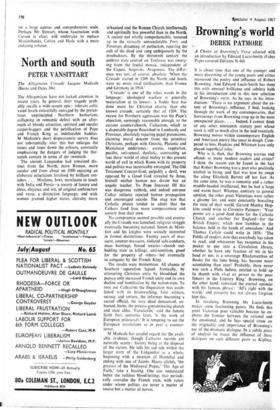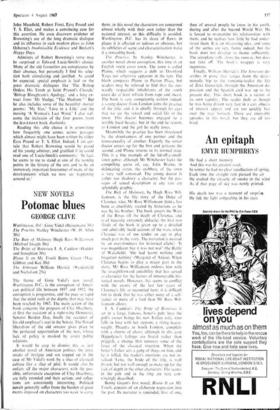Browning's world
DEREK PATMORE
A Choice of Browning's Verse selected with an introduction by Edward Lucie-Smith (Faber Paper-covered Editions 9s 6d) It is about time that one of the younger and more discerning of the young poets and critics reassessed the poetry and influence of Robert Browning. And Edward Lucie-Smith has done this with unusual brilliance and subtlety both in his introduction and in this new selection of Browning's verse. As he says in his intro- duction : 'There is no argument about the ex- tent of Browning's influence. I find, looking through the work of my contemporaries, that borrowings from Browning crop up in the most unexpected places. . . . Indeed, I cannot think of any other nineteenth century poet whose work is still so much alive in the mid-twentieth. Browning moves within contemporary English and American poetry like yeast in dough. Com- pared to him, Hopkins and Whitman have only played superficial roles.'
Why is it, then, that Browning worries and offends so many modern readers and critics? I think the reason can be found in the fact that Robert Browning was a poet who positively exulted in living, and that was how he swept the ailing Elizabeth Barrett off her feet. At the same time, he was a romantic and a rather muddle-headed intellectual, but he had a large and warm heart. Whereas, contrary to general opinion, the other great Victorians were rather a gloomy lot, and were constantly bewailing the state of their world. Gerard Manley Hop- kins could write to Coventry Patmore: 'Your poems are a good deed done for the Catholic Church and another for England—for the British Empire, which now trembles in the balance, held in the hands of unwisdom.' And Thomas Carlyle could write in 1856: 'The Public of readers, now that everybody has taken to read, and whosoever has twopence in his pocket to pay into a Circulation library, whether he have any fraction of wit in his head or not, is a sovereign Rhadamanthus of Books for the time being, has become more astonishing thpn ever! Probably, there never was such a Plebs before, entitled to hold up its thumb with vivat or pereat to the poor fencers in the Literary Ring.' Browning, on the other hand, remained the eternal optimist with his famous phrase : 'All's right with the world,' and posterity has not always forgiven him this.
In revaluing Browning Mr Lucie-Smith makes some fascinating points. He _finds this great Victorian poet valuable because he ex- plores the frontier between the rational and the emotional, and he lays special stress on the originality and importance of Browning's use of the dramatic dialogue. In a subtle piece of analysis he traces the influence of these dialogues on such different poets as Kipling,
John Masefield, Robert Frost, Ezra Pound and T. S. Eliot, and makes a convincing case for this assertion. He even discovers evidence of Browning's use of the long dramatic dialogue and its influence in such modern plays as John Osbome's Inadmissible Evidence and Beckett's Happy Days.
Admirers of Robert Browning's verse may be surprised at Edward Lucie-Smith's choice. Many of the old favourites are conspicuous by their absence, but personally I find his selec- tion both stimulating and justified. As could be expected, special emphasis is laid on the great dramatic dialogues like 'The Bishop Orders His Tomb at Saint Praxed's Church,' `Bishop Bloughram's Apology,' and a long ex- tract from 'Mr Sludge, "The Medium."' But he also includes some of the beautiful shorter poems: 'My Star,' Love in a Life,' and the moving 'A Woman's Last Word.' 1 also wel- come the inclusion of the four poems from the less-known book Asolando.
Reading this able choice it is astonishing how frequently one comes across passages which almost might have been written by either Ezra Pound or T. S. Eliot. Indeed, I am cer- tain that Robert Browning would be proud of his young admirer, and gratified if he could read one of Lucie-Smith's comments: 'In fact, he seems to me to stand at one of the turning points in the history of the arts and to be an immensely important forerunner of many of the developments which we now see happening around us.'































 Previous page
Previous page